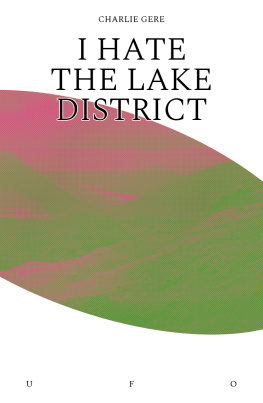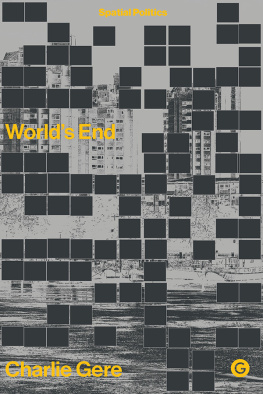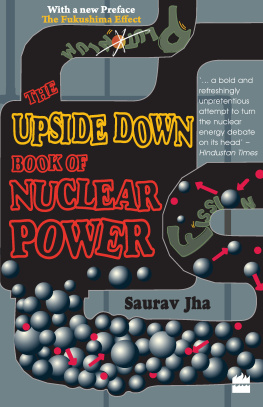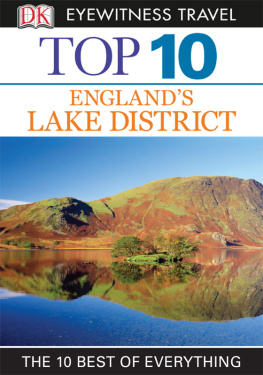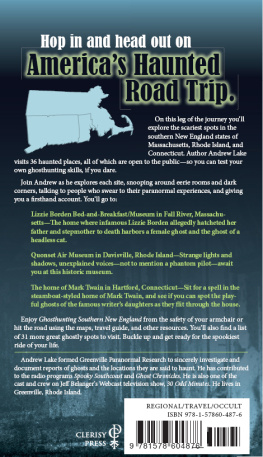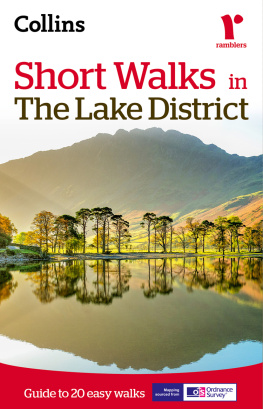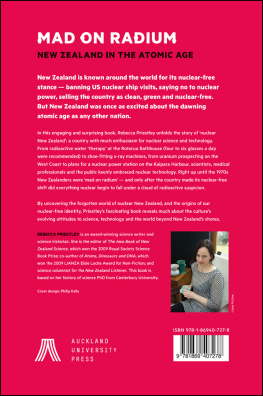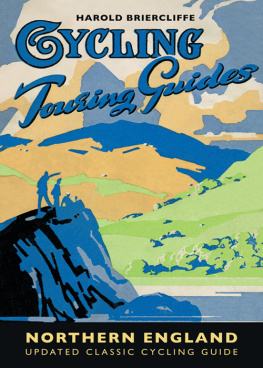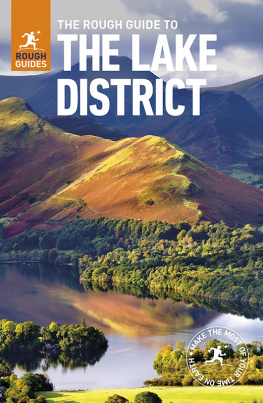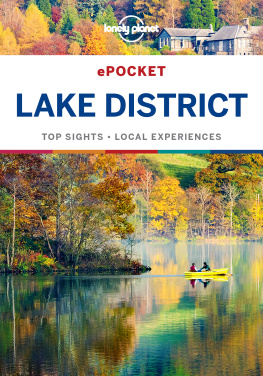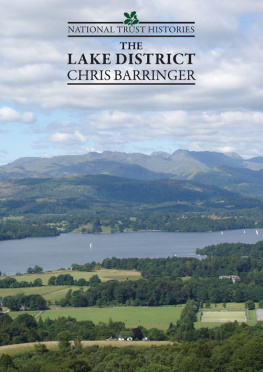I Hate the Lake District
Part of the Goldsmiths Press Unidentified Fictional Objects Series
I Hate the Lake District
Charlie Gere

2019 Goldsmiths Press
Published in 2019 by Goldsmiths Press
Goldsmiths, University of London, New Cross
London SE14 6NW
Printed and bound by TJ International
Distribution by the MIT Press
Cambridge, Massachusetts, and London, England
Copyright 2019 Charlie Gere
The right of Charlie Gere to be identified as the author of this work has been asserted by him in accordance with sections 77 and 78 in the Copyright, Designs and Patents Act 1988.
All Rights Reserved. No part of this publication may be reproduced, distributed or transmitted in any form or by any means whatsoever without prior written permission of the publisher, except in the case of brief quotations in critical articles and reviews and certain non-commercial uses permitted by copyright law.
A CIP record for this book is available from the British Library
ISBN 978-1-912685-11-0 (pbk)
ISBN 978-1-912685-12-7 (ebk)
www.gold.ac.uk/goldsmiths-press

d_r0
Contents
Many thanks to Charlotte Fairbairn and Bronwen Riley for escapades in Cumbria and for pointing me in the direction of places to see, to Adam Sutherland, Alistair Hudson and all those involved with Grizedale Arts for shaping my understanding of the Lake District, to Jenn Ashworth, Fiona Candlin and Peter Davidson for taking the time to read draft material, and for their generous encouragement, to the anonymous readers for Goldsmiths Press for their positive reactions, to colleagues at Lancaster University and elsewhere for listening patiently to early versions of this book, and, above all, to my wife Lucinda for her superhuman tolerance.
The Snow Party from New Collected Poems (2011) by Derek Mahon appears by kind permission of the author and the Gallery Press, Loughcrew, Oldcastle, County Meath, Ireland. Poems from Imaginary Postcards (Clints Grikes Grips Glints) by Jonathan Williams appear by kind permission of the Literary Estate of Jonathan Williams. Excerpts from Briggflatts by Basil Bunting from Complete Poems (2000), edited by Richard Caddell, appear by kind permission of Bloodaxe Books, 2000. The excerpt from St. Roach in The Collected Poems of Muriel Rukeyser, Copyright 2005 by Muriel Rukeyser, is reprinted by permission of ICM Partners. To the Stone-Cutters, 1924 and renewed 1952 by Robinson Jeffers from The Selected Poetry of Robinson Jeffers by Robinson Jeffers, used by permission of Random House, an imprint and division of Penguin Random House LLC. All rights reserved.
The somewhat juvenile title of this book comes from the story about Malcolm McLarens first encounter with John Lydon, later known as Johnny Rotten, who was wearing a Pink Floyd T-shirt with the words I Hate written in biro at the top. It turns out that Lydon was always a fan of Pink Floyds music, but hated the pomposity of the prog rock music culture the band epitomised. In the same way, I love the North West of England, but hate the Lake District, and the way its fetishised and sacralised as some kind of unspoilt paradise, a consolatory Eden to which those battered by contemporary life can retreat. I also love it, guiltily, for the very reasons that I hate it. I am overwhelmed, for example, by the experience of the mountains of the North Lakes in the autumn light, and uneasy that the pleasure I feel is a false appeal to nature as redemptive. I Hate the Lake District is an attempt to deal with this unease and to present a different view of the Lake District and the North West of England to that found in most accounts. It is also an engagement with the problematic idea of nature that seems to obsess certain contemporary writers, and their readers. The natural world, whatever that might be, is fetishised as a kind of redemptive alternative to the human world. Yet, of course, nature, as a concept, can exist only in a binary relation with that world. Outside of that relation it can have no meaning at all.
The origins of the book go back some years to a time when I found myself alone for several months. My wife was looking after family down south. After an initial period of adjustment and a certain amount of resentment, I grew to enjoy the freedom her absence gave me. What I particularly liked was the opportunity to do something that can really only be done alone; to go for long drives with no particular aim or to look at some sight that I had read about and that intrigued me. The area where these peregrinations took place was then mostly in Cumbria, and to a lesser extent in Lancashire and North Yorkshire.
There are precedents for this kind of writing, going back to Jean-Jacques Rousseaus Reveries of the Solitary Walker, and, more recently, the work of Yves Bonnefoy, W. G. Sebald, Iain Sinclair and Annie Dillard, among others. However, Rousseau, Sebald and Sinclair are walkers, and their writings are structured by the act of walking. Though I enjoy walking greatly, whether in the Lakes or elsewhere, the main form of mobility in this book is driving. In fact this book emerges out of the cinematic experience of driving through the Lakes and the North West of England, with the car windscreen acting as a kind of cinema screen, and the radio, tuned to BBC 6 Music, offering the soundtrack. Perhaps each chapter can be thought of as a kind of miniature road movie (even though the road movie is a not a genre that suits England much. The country is too small and too populated).
It was always with the intention of writing about them that I undertook these journeys. I wanted to write in the same way I wanted to travel, without plans, open to what may arrive, free to pursue connections however tenuous, and above all to enjoy the process of writing without the necessity of undertaking it for some prior purpose. To write like this is also to be free of the disciplinary demands of academia, which I had begun to find increasingly frustrating. Being, in every sense, undisciplined, I found that the increasing instrumentalisation of research was beginning to feel like a cage. Like Melvilles Bartleby the Scrivener, I wished to say I would prefer not to to such demands. I wanted to recover the stupidity of study. The Italian philosopher Giorgio Agamben makes the connection directly by claiming the etymology of the word studium goes back to a st- or sp- root, indicating a crash, the shock of an impact and thus that studying and stupefying are akin. [T]hose who study are in the situation of people who have received a shock and are stupified by what has struck them, unable to grasp it and at the same time powerless to leave hold.
We had moved to the North West of England more than a decade before the journeys described, for me to take up a Readership at Lancaster University. That I should end up in such a place was, to say the least, surprising. I was born and brought up in a part of West London known as the Worlds End. Though the name derived from a coaching inn that had been in the area since the seventeenth century, it seemed suitably apocalyptic for the period of my childhood, that of 1960s and the 1970s and the Cold War. Back in the 1970s, London was a strange place, much emptier, and far more run down than it is now, in its current incarnation as the capital city of neoliberalism and tax evasion. Accordingly, like many of my contemporaries, I was drawn to a certain cultural ethos and aesthetic, involving Punk Rock and New Wave music (especially New York New Wave), as well as that of David Bowie (of course), the films of Andrei Tarkovsky and David Lynch, the writing of J. G. Ballard, Don Delillo, Philip K. Dick and, later on, David Foster Wallace. Taken as a whole, these different sources offered a kind of bleak vision of a kind of post-apocalyptic culture. It was also a thoroughly urban vision, with little or no connection to ideas about nature and the rural.

